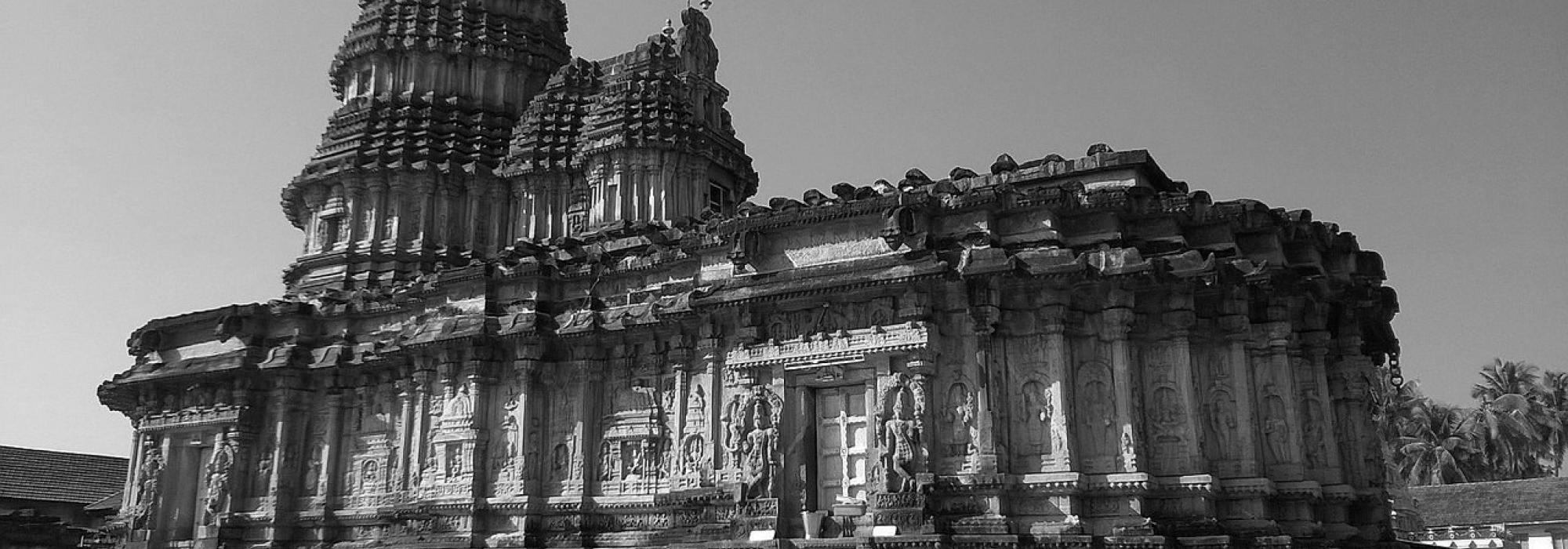Our Visit to Sringeri
Sri Chandrashekhara Bharati was the presiding Jagadguru during our visit to Sringeri back then. About a couple of weeks before Sastri’s visit to Sringeri, the Jagadguru had supposedly taken up a certain oath – he had stopped delivering lectures and giving lessons. All the resident students and scholars had been instructed to constantly chant the Gāyatrī-mantra on those days. The reason for this will be clear in the due course of my writing. Srinivasa Sastri who was visiting Sringeri with his family had the darśan (‘a meeting/ an audience with a deity/ Guru’) of the Svāmi during the pūjā, as it was premediated. The Svāmi enquired about his well-being and instructed Sastri in the following manner:
“I am glad that you have come here. It seems like Śāradā-devī (the presiding deity of Sringeri) herself has brought you here – to get her task executed. It is something important in the view of safeguarding our dharma. I have heard that there is a certain law pertaining to the Hindu marriages that is being discussed at the parliament in Delhi. Apparently, it is called the ‘Sharada Bill’. What kind of times are these? Should we name an idea that is totally contrary to Śāradā-devī’s view after her? We certainly need to do something about this strange set of circumstances. The Emperor has honoured you by including you in his Privy Council. I have heard that the members of the council can meet the Viceroy in person and can explain their views to him. You should meet the Viceroy and appropriately advise him such that this Apasmārāsura (a demon) is stopped immediately. We (royal ‘we’) have given up all teaching and lectures for the last fifteen days with the hope of countering the attempts being made by the bill at the Centre. We have instructed all the students and scholars residing here to constantly chant the Gāyatrī-mantra. We have taken up an oath to go ahead with this lifestyle until our prayer is answered.
Sastri, who heard this brief speech of the Jagadguru replied:
“It is time for the pūjā now. We will need time to think out the matter that you have just touched upon. If you could please permit me to do so, let us discuss this matter on another occasion”.
Prasāda
The Jagadguru consented and went ahead with the pūjā. After the pūjā, the Jagadguru offered phala-mantrākṣatā to Sastri and his wife Lakshmamma and blessed the couple. Something interesting happened at this instance. The Jagadguru placed a golden tāli and a handwritten note in Sastri’s hand and said:
“You should ask your wife to wear this taali”
Sastri: “We are privileged, thanks to the blessings of the Guru. As per your command, I shall have her wear this in the Śāradā-devī temple tomorrow. She has lost all confidence looking at the illness I am suffering from and she is constantly worried about my longevity. I’ll act as per the Guru’s instruction for her mental well-being. I’ll also keep the śloka safe and remember the same. I can’t speak much.”
They bowed down to the Guru and returned to their lodge. I then asked Sastri:
Me: “What did you intend to say? What was the śloka that you mentioned?”
Sastri:”I have not been performing the sandhyāvandana regularly. It has, in fact, been quite a long time since I stopped performing the sandhyāvandana. Such being the case, how can I give my word to the Jagadguru that I will regularly chant the śloka? The śloka looks really ordinary. Don’t we have hundreds of such ślokas and stotras in our tradition? What is so special about it? However, the person adorning the Guru’s pedestal has given it to me with great affection. It is our duty to respect it.”
The following day, we spoke about the wedding rituals at the mutt. The conversation between the Jagadguru and Srinivasa Sastri was in Tamil – Tamil mixed with Sanskrit – I am sure that the readers would have guessed this. Sastri put forth the matter in two dimensions – one personal and the other related to the śāstra. He said –
“The Bill says that the minimum age for the marriage of girls needs to be increased. I too have always had the same opinion. A few years back when I was a member of the Legislative Council of Madras, I had felt that this was a welcome change. I had even drafted my thoughts and brought it before the council for discussion. Back then, the council was full of government officials and it was also a pre-decided norm that the governing council would not interfere in the religious matters. Thus, my suggestion was not taken up for serious discussion. My opinion, however, has still remained the same. Somebody else has put forward the same idea at the Centre and is it right for me to oppose it? When somebody else is supporting the idea that I have always had, how can I oppose it? Moreover, in about three to four weddings that have taken place in my own family, the bride was much older than the recommended age. It is not merely my opinion but what I have been practising too. The two together can be helpful in bringing the required change in the system. Therefore, it does not seem right for me to oppose the Sharada Bill”
To be continued...
This is the twenty-fourth part of the English translation of the Second essay in D V Gundappa’s magnum-opus Jnapakachitrashaale (Volume 6) – Halavaru Saarvajanikaru.















































